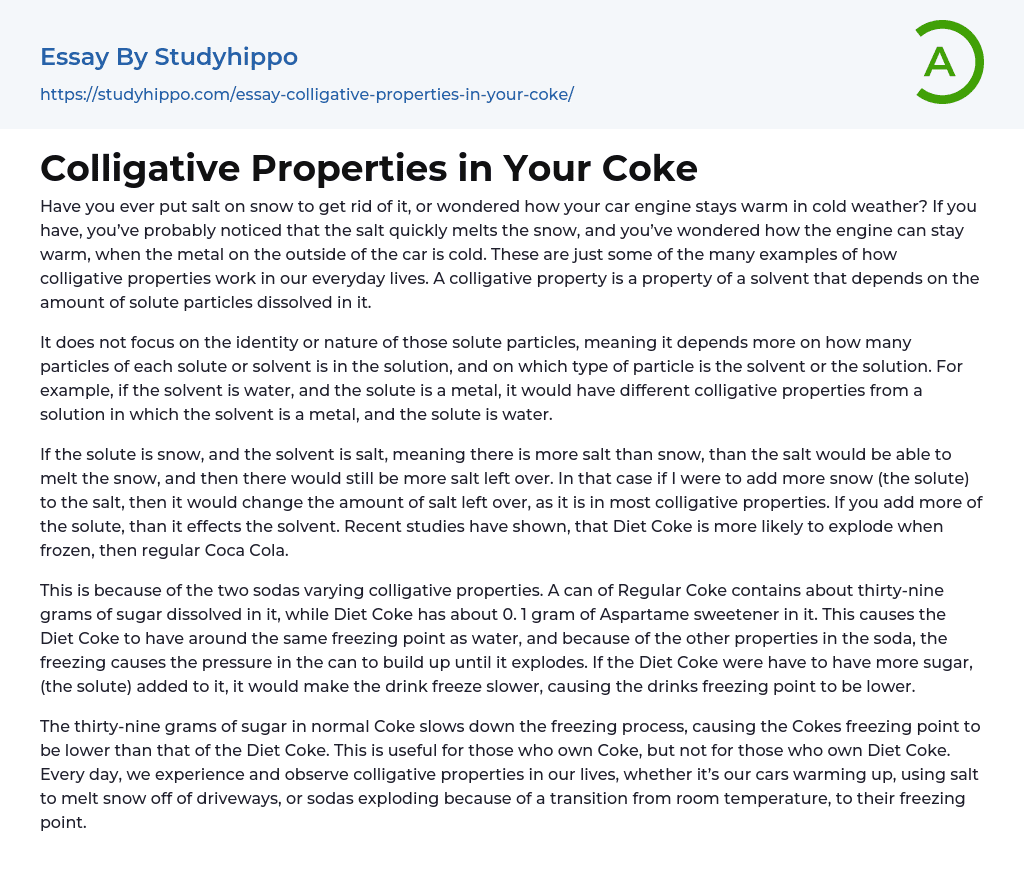Have you ever put salt on snow to get rid of it, or wondered how your car engine stays warm in cold weather? If you have, you’ve probably noticed that the salt quickly melts the snow, and you’ve wondered how the engine can stay warm, when the metal on the outside of the car is cold. These are just some of the many examples of how colligative properties work in our everyday lives. A colligative property is a property of a solvent that depends on the amount of solute particles dissolved in it.
It does not focus on the identity or nature of those solute particles, meaning it depends more on how many particles of each solute or solvent is in the solution, and on which type of particle is the solvent or the
...solution. For example, if the solvent is water, and the solute is a metal, it would have different colligative properties from a solution in which the solvent is a metal, and the solute is water.
If the solute is snow, and the solvent is salt, meaning there is more salt than snow, than the salt would be able to melt the snow, and then there would still be more salt left over. In that case if I were to add more snow (the solute) to the salt, then it would change the amount of salt left over, as it is in most colligative properties. If you add more of the solute, than it effects the solvent. Recent studies have shown, that Diet Coke is more likely to explode when frozen, then regular Coca Cola.
This is
because of the two sodas varying colligative properties. A can of Regular Coke contains about thirty-nine grams of sugar dissolved in it, while Diet Coke has about 0. 1 gram of Aspartame sweetener in it. This causes the Diet Coke to have around the same freezing point as water, and because of the other properties in the soda, the freezing causes the pressure in the can to build up until it explodes. If the Diet Coke were have to have more sugar, (the solute) added to it, it would make the drink freeze slower, causing the drinks freezing point to be lower.
The thirty-nine grams of sugar in normal Coke slows down the freezing process, causing the Cokes freezing point to be lower than that of the Diet Coke. This is useful for those who own Coke, but not for those who own Diet Coke. Every day, we experience and observe colligative properties in our lives, whether it’s our cars warming up, using salt to melt snow off of driveways, or sodas exploding because of a transition from room temperature, to their freezing point.
- Cocaine essays
- Why Marijuana Should Be Legalized essays
- Drug Abuse essays
- Teenage Drug Abuse essays
- Bottled Water essays
- Adidas essays
- Amazon essays
- Apple essays
- Bmw essays
- British Airways essays
- Burger King essays
- Coca-Cola essays
- Company essays
- Costco essays
- Dell essays
- Ebay essays
- Enron essays
- Facebook essays
- Ford Motor Company essays
- Gap essays
- General Motors essays
- Google essays
- Honda essays
- Ibm essays
- Ikea essays
- Intel essays
- Iphone essays
- Johnson and Johnson essays
- Kellogg essays
- Key essays
- Kfc essays
- Mcdonald's essays
- Microsoft essays
- Myspace essays
- Nestle essays
- Netflix essays
- Nike essays
- Nokia essays
- Pepsi essays
- Pepsico essays
- Red Bull essays
- Ryanair essays
- Samsung essays
- Sony essays
- Southwest Airlines essays
- Starbucks essays
- Supermarket essays
- Tesco essays
- Toyota essays
- Twitter essays




